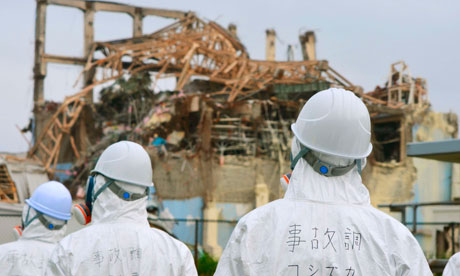Nuclear industry dreams dashed by current economic reality
It was the financing model and rates of return that prompted German nuclear giants RWC and E.ON to pull out of UK energy plans
Martin Cohen
guardian.co.uk, Monday 2 April 2012 05.58 EDT
 Japan's Fukushima nuclear plant was built just above sea-level, with cliffs bulldozed – a risky plan forced by economic necessity. Photograph: Kyodo/Reuters
Japan's Fukushima nuclear plant was built just above sea-level, with cliffs bulldozed – a risky plan forced by economic necessity. Photograph: Kyodo/Reuters
The news that nuclear giants RWE and E.ON are dropping plans to build any new UK reactors has sent a toxic cloud not only over Wales, but over the nuclear industry itself.
Of course, everyone knows nowadays, post-Chernobyl, post-Fukushima, that nuclear power plants are not really safe. Even if there are a few noisy die-hards, arguing that the resulting radiation is harmless, and that "hardly anyone" dies as a direct consequence of atomic meltdown, that old canard just won't wash any more.
Other nuclear myths, though, have lingered on. Atomic energy, unveiled by Her Majesty with grand aplomb at Calder Hall half a century ago, still has a hi-tech glamour, an aura of somehow being "the future". The reality that atomic plants are basically steam engines staffed by thousands of casual workers who would otherwise be picking strawberries or digging up roads somehow never impinges. Perhaps one of the most shocking images post-Fukushima, was of unskilled workers hosing sea water onto the smouldering wreckage. Not here the calm, fatherly figures in their white lab-coats in front of consoles worthy of the Starship Enterprise.
But there are solid, practical reasons why nuclear power relies on casual staff using dustpans and brushes to sweep up radioactive dust, or hoses to cool down spent fuel. Best of which is that it's cheaper. An enlightening fact about Fukushima, where the tsunami swept over the safety wall, was that at this point on the coast, the land is well above the level of any waves, tsunami or otherwise. It required considerable ingenuity to bulldoze the cliffs down to sea-level to construct a plant that was then potentially at risk. However, the plant operators knew that nuclear electricity is not actually "too cheap to meter", whatever Eisenhower may have said, and the additional cost of pumping seawater up to the top of the cliffs would have eaten into their bottom line. Hence, the small, if ever so slightly risky, strategy of situating the complex at sea-level.
So the torpedo that has just been launched at the majestic British nuclear ship by the sneaky German energy corporations has...
